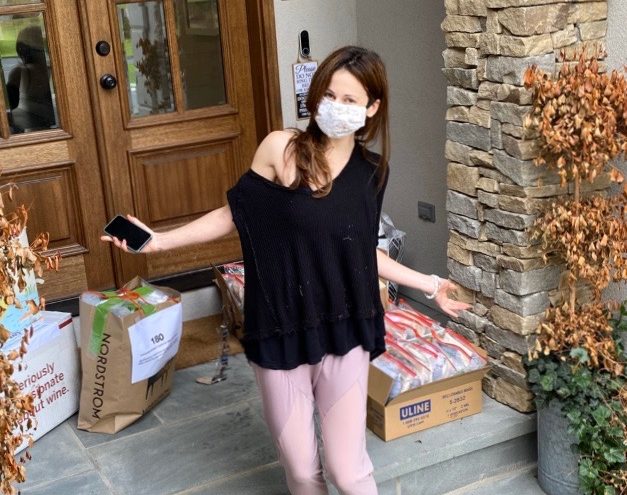Masks as Medicine for the Makers
When New Jersey residents were first ordered to shelter-in-place due to the rapidly spreading COVID-19 virus, Dr. Sarah Shell found it hard to just stay home and not be out helping, even though she knew it was the right thing to do to keep her family and the community safe. But she soon found herself fighting the spread of COVID-19 right from her kitchen table.
As a dentist with an extensive fashion design background, Sarah quickly realized she was in the unique position of both wearing a mask professionally and being able to construct a mask on her own. “Early on in the pandemic there was a fear that there would be a shortage of N95 and surgical masks for hospitals and frontline workers,” said Sarah, “and through my design network I heard of sewers coming together to make ‘masks for masks’ to wear over N95 masks to allow for reuse.” She quickly connected with the New York City Face Mask Initiative (NYCFMI) of Alternew (a sustainable fashion company) that was distributing mask materials and supplies to sewers throughout the New York metro area. While waiting for her first set of materials to arrive, Sarah posted on her hometown Watchung NJ Facebook group to see if anyone nearby might also be interested in making masks. The response was overwhelming! Within 24 hours, she received hundreds of comments on her post. Neighbors sprang into action and Sarah was soon coordinating a small army of mask-makers right in her backyard. With so many requests for mask patterns, Sarah and a design friend stayed up late one evening tweaking designs to create a mask that maximized efficacy and comfort. Working with the Watchung network and the NYCFMI, Sarah began distributing hundreds of masks to frontline healthcare workers and to the Summit Medical Group Foundation (SMGF), a non-profit organization focused on creating healthy communities. Word spread and soon the Civil Air Patrol U.S. Air Force Auxiliary teamed up with Sarah, creating masks for high-risk Summit Medical Group patients.
The need grew even more rapidly when the CDC began recommending that everyone wear masks in situations where social distancing is difficult. As a long time SMGF supporter, Sarah had volunteered with SMGF’s Healthy Tomorrows Community Outreach program in the past. The program provides education, one-on-one counseling and free medical screenings for diabetes, pre-diabetes, hypertension and obesity at local food pantries – places where social distancing is next to impossible. When COVID-19 struck, SMGF quickly pivoted from in-person programs to reaching out by phone. Staff connects often with clients, continuing to help them prevent and manage diabetes, pre-diabetes, hypertension and obesity, and also educating them about COVID-19. In calls in both English and Spanish, staff share information regarding preventing the spread of COVID-19, provide stress management techniques and help clients determine which food pantries near them are open and when. We quickly learned that many of our food pantry partners desperately needed masks to continue operating safely – for both the people handing out food and the people receiving it. Sarah didn’t miss a beat in meeting that need, immediately committing to supply pantry workers and clients with handsewn masks that can be washed and reused again and again. “I will never forget volunteering at a health screening with my husband Eric [Summit Medical Group Neurologist Dr. Eric Cohen] when an elderly woman we were screening had a blood pressure reading through the roof. She immediately was sent for urgent care … but she never would have even known she was at risk if she wasn’t in SMGF’s free screening program. That moment emanated with us … the work [SMGF does] providing health screenings and education in local food pantries is just so important.”
Sarah’s tireless efforts in creating patterns, organizing supply chains and sewers and connecting organizations together has resulted in the donation of over 1500 masks to SMGF, with more to come. The masks have been distributed to frontline healthcare workers, vulnerable patients and to local food pantries. Sarah estimates that it takes six to seven people to get a mask to someone who needs it, but the masks don’t only help those who ultimately wear them. “In the end it’s not just the mask wearer who is helped through this effort.” reflected Sarah, “Keeping hands and minds busy throughout this crisis has really been medicine for the mask makers as well as the recipients.”


